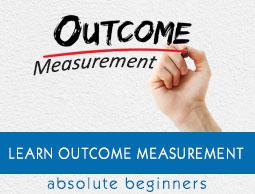Outcome Measurement - Data Collection
A data collection method needs to include all the factors, such as available sources, resources, activities done, delivered output, and final accomplishments. Data can be collected using methods such as surveys, interviews, observational sources, and record checking. We need to consider the pros and cons of data collection in the following fields −
Type of information needed − Some outcomes and indicators require a specific method to collect data, as compared to other cases where data can be collected in any method.
Validity and reliability − Some methods are more accurate in their outcomes than others.
Resources available − Resources include employees, time taken, and logistics.
Cultural correctness − Taking into the account the customers, beliefs and other sensitive details of the culture of people whom training is delivered.
Surveys
Surveys are standardized methods that can be used to collect information through mail or in person. The one area where surveys have a clear advantage over any other method of data collection is their cost ratio. You can engage a large number of people and collect data at a low cost.

Surveys, however, have their own share of disadvantages. Survey processes conducted over email are very time-consuming and have very low responses ratio, as people have the choice to opt out of it anytime they want. The slowness of responding to the surveys could also make the data irrelevant by the time it is completed. Any mechanisms employed to increase responses will add up to the cost.
The other big disadvantage is that surveys conducted over emails can also be misinterpreted, with no one to correctly explain the meaning of sentences where a reader gets any doubts. To minimize such incidents, a screening round of the email surveys in conducted where all possible doubts and ambiguous interpretations are taken into note, and corrective work is done to avoid confusions on the meanings of the questions.
Interviews
The advantage of conducting interviews over other methods of data collection is its standardization. Every person is asked the same set of questions and is evaluated based on the same parameters, even if they are conducted person-to-person or via telephonic medium.
In comparison to a written survey, an interview gives an opportunity to ask more complex and deeper questions, and the interviewer can also clarify his question and put it in a simpler way, in case the person doesn’t understand it. The participants can also engage in a broader discussion-based answering style.

Taking interviews to collect data can be very time consuming because one needs to dedicate a certain amount of time for each candidate. Hence, it becomes an expensive method of data collection.
Interviews may end up giving misleading information if the interviewers are not properly trained. They might lead the participant toward the right answers unknowingly, or could take an observation in a different meaning.
Focus Groups

It is a special type of interview conducted to get information in a particular field related the participants’ strengths and abilities. Although interviews are generally conducted to exact information from candidate without any influence from the interviewer, focus groups allow the participants to share their opinions, which sometimes leads to people influencing one another’s thoughts, and leading to debates.
The advantages of focus groups are that because of its debate-oriented nature, it triggers memory recollection and some very relevant and important information about the topic gets collected in a short period, which wouldn’t have been possible through interviews
The disadvantages of a focus group are that the outcomes of such debates or conversations rarely can be applied to the entire collection of participants, hence focus groups are often conducted after surveying a group of people to check for their concepts and beliefs.
Observation

Observations are often associated with the task of recording individual communication between people. These processes need well-trained observers and clear instructions on the process of observing, which includes whom to observe and for how long.
The biggest advantage of the method of observation is that it generates a big collection of information based on first-hand, unbiased information collected from participants. Observations, however, require a lot of time and more dedicated resource deployment than any other method, hence they become costlier as well.
Record Review
Record review is the process of collecting data from internal records of an organization, or from records of other groups, such as financial records, monthly reports, activity logs, purchase receipts, etc.
In this method, the process of collecting information becomes very easy, as the data is already compiled and available. It is a fast, economical, and efficient process of information gathering and saves people a lot of time from arranging and cataloguing data. In addition to that, just a few changes to the existing data collection model will provide us a new information system






